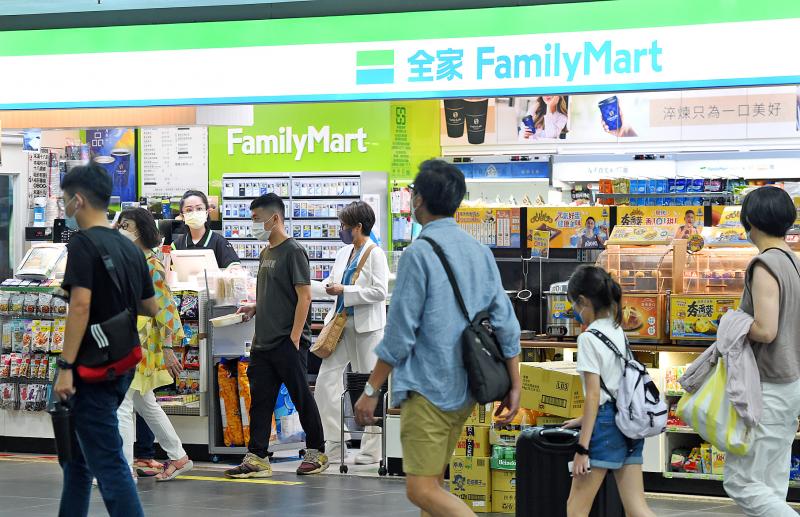The consumer confidence index this month sank to 64.5, the lowest in 12.5 years, as a persisting stock rout and COVID-19 infections have made consumers apprehensive, a survey by National Central University found yesterday.
The index fell 3.67 points from one month earlier to the same level as the global financial crisis in 2008-2009, with all six component measures taking a hit, said Dachrahn Wu (吳大任), director of the university’s Research Center for Taiwan Economic Development, which conducted the survey.
In particular, the sub-index on stock investment tumbled 7.4 points to a record low of 25.5, suggesting that a majority of investors prefer to stay on the sidelines, scared by wild corrections at home and abroad, Wu said.

Photo: Liao Chen-hui, Taipei Times
The sub-index on the nation’s economic outlook fell 4.9 points to 80.95, the softest since June 2020, as concerns over an economic turnaround continue to build up even though key economic bellwethers, such as exports and industrial output, hold firm, Wu said.
Confidence values of 100 and more suggest positive sentiment and scores lower than the threshold indicate pessimism.
Interest rates on 30-year mortgages approached 6 percent in the US, which could squeeze spending on non-essential items, Wu said, adding that the trend is unfavorable for Taiwanese manufacturers, because many supply electronic parts used in smartphones, laptops, TVs, vehicles and peripheral devices.
Taiwanese also expressed unease over rising inflationary pressures, depressing the confidence measure on consumer prices to 26.65, the lowest level since December 2008, the survey showed.
Consumer price hikes are most evident at restaurants and department stores, Wu said.
Interest in consumption of durable goods shed 2.9 points to a record low of 111.9, while interest in real-estate properties dropped by 5.55 points to 105.55, the lowest since the launch of the index, the university said.
Taiwan’s interest rate hikes, although relatively moderate, would still make buyers cautious about financial planning to avoid cash strain, Wu said.
The central bank has raised interest rates by 1.5 percent in two adjustments this year and is expected to tighten further if consumer prices fail to ease.
The university said it polled 2,792 adults between June 18 and Tuesday last week by telephone.

To many, Tatu City on the outskirts of Nairobi looks like a success. The first city entirely built by a private company to be operational in east Africa, with about 25,000 people living and working there, it accounts for about two-thirds of all foreign investment in Kenya. Its low-tax status has attracted more than 100 businesses including Heineken, coffee brand Dormans, and the biggest call-center and cold-chain transport firms in the region. However, to some local politicians, Tatu City has looked more like a target for extortion. A parade of governors have demanded land worth millions of dollars in exchange

Hong Kong authorities ramped up sales of the local dollar as the greenback’s slide threatened the foreign-exchange peg. The Hong Kong Monetary Authority (HKMA) sold a record HK$60.5 billion (US$7.8 billion) of the city’s currency, according to an alert sent on its Bloomberg page yesterday in Asia, after it tested the upper end of its trading band. That added to the HK$56.1 billion of sales versus the greenback since Friday. The rapid intervention signals efforts from the city’s authorities to limit the local currency’s moves within its HK$7.75 to HK$7.85 per US dollar trading band. Heavy sales of the local dollar by

Taiwan Semiconductor Manufacturing Co’s (TSMC, 台積電) revenue jumped 48 percent last month, underscoring how electronics firms scrambled to acquire essential components before global tariffs took effect. The main chipmaker for Apple Inc and Nvidia Corp reported monthly sales of NT$349.6 billion (US$11.6 billion). That compares with the average analysts’ estimate for a 38 percent rise in second-quarter revenue. US President Donald Trump’s trade war is prompting economists to retool GDP forecasts worldwide, casting doubt over the outlook for everything from iPhone demand to computing and datacenter construction. However, TSMC — a barometer for global tech spending given its central role in the

An Indonesian animated movie is smashing regional box office records and could be set for wider success as it prepares to open beyond the Southeast Asian archipelago’s silver screens. Jumbo — a film based on the adventures of main character, Don, a large orphaned Indonesian boy facing bullying at school — last month became the highest-grossing Southeast Asian animated film, raking in more than US$8 million. Released at the end of March to coincide with the Eid holidays after the Islamic fasting month of Ramadan, the movie has hit 8 million ticket sales, the third-highest in Indonesian cinema history, Film